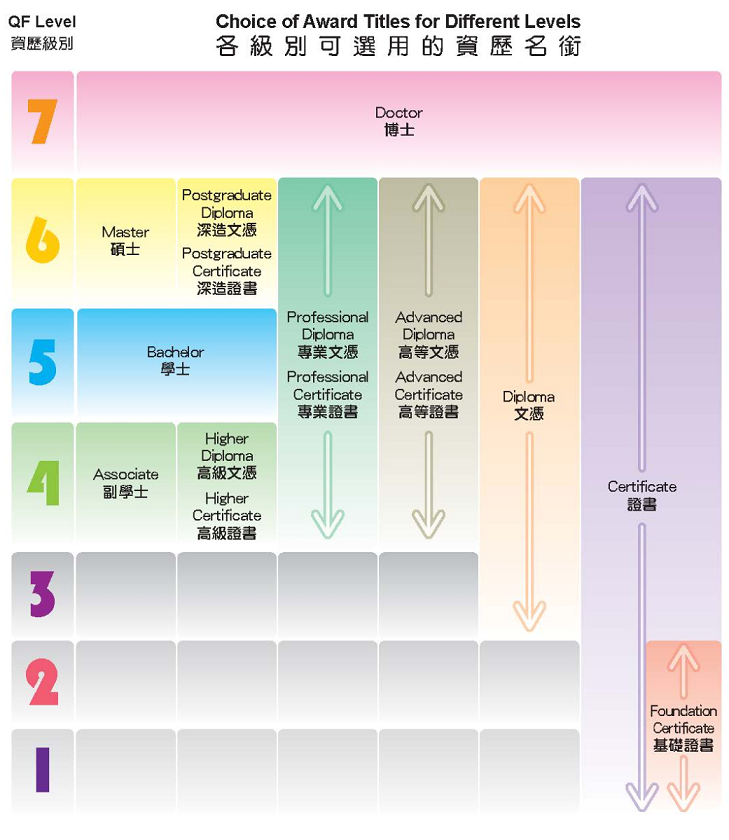Benefits of HKQF and Key features of QF-recognised qualifications
Benefits of HKQF : HKQF promotes continuing education and lifelong learning. It provides various deliverables and support for industry stakeholders, including employers, practitioners, professional bodies, as well as education and training providers and learners with a view to continuously enhancing the quality, professionalism and competitiveness of our workforce in an increasingly globalised and knowledge-based economy.
Key features of QF-recognised qualifications :
- QF Level : reflects the depth and complexity of learning leading to a qualification
- QF Credit : indicates the volume or size of learning of a qualification
- Award Titles Scheme (ATS) : reveals the nature, area of studies and range of QF levels of a qualification
Policy Objectives
The primary objective of establishing the HKQF by the Education Bureau (EDB) of the Government of the Hong Kong Special Administrative Region (HKSAR) is to provide a platform that encourages and facilitates lifelong learning, with a view to enhancing the capability and competitiveness of the workforce in Hong Kong.
The objectives are to be achieved through:
defining clear and objective standards applicable to qualifications in the academic, vocational and professional as well as continuing education sectors
assuring the quality of qualifications and the associated learning programmes available to learners
assuring relevancy of learning to industry needs
Legal Framework
Enacted by the Legislative Council in 2007, the Accreditation of Academic and Vocational Qualifications Ordinance (AAVQO) (Cap.592) provides the legal framework for the quality assurance mechanism underpinning the QF established by the Secretary for Education (SED). The HKQF was officially launched on 5 May 2008, when the said Ordinance came into full operation.
Under the AAVQO, the Hong Kong Council for Accreditation of Academic and Vocational Qualifications (HKCAAVQ) has been appointed by the Secretary for Education as the Accreditation Authority and Qualifications Register Authority. The HKCAAVQ currently takes on its statutory quality assurance role to safeguard the quality and standards of learning programmes recognized under the QF.
Quality Assurance Mechanism
The HKQF is underpinned by a robust quality assurance mechanism to ensure that all QF-recognised qualifications are of good quality and standard. According to the Accreditation of Academic and Vocational Qualifications Ordinance (Cap.592), the Hong Kong Council for Accreditation of Academic and Vocational Qualifications (HKCAAVQ) is specified as the Accreditation Authority and the Qualifications Register (QR) Authority. It is tasked with the responsibility of assuring the quality of qualifications recognised under the QF and the administration of the QR. The Ordinance enables HKCAAVQ to assess academic and vocational and professional programmes conducted by non-self-accrediting institutions. As such, self-accrediting institutions* will not be affected. The University Grants Committee (UGC) has established a Quality Assurance Council (QAC) to assist the UGC in assuring the quality of all programmes at the levels of sub-degree, first degree and above (however funded) offered in UGC-funded universities.
* The nine self-accrediting institutions are City University of Hong Kong, Hong Kong Baptist University, Lingnan University, The Chinese University of Hong Kong, The Education University of Hong Kong, The Hong Kong Metropolitan University, The Hong Kong Polytechnic University, Hong Kong University of Science and Technology and The University of Hong Kong.
Appeal Board under the Accreditation of Academic and Vocational Qualifications Ordinance (Cap.592)
The Appeal Board is an independent appeal mechanism established under Section 10(1) of the Accreditation of Academic and Vocational Qualifications Ordinance (Cap.592) to determine appeals against the accreditation decision by the Accreditation Authority or a decision on the entry of a qualification into the QR by the QR Authority. HKCAAVQ is specified as the Accreditation Authority and QR Authority.
Terms of Reference
The Appeal Board provides an independent avenue for aggrieved parties to review the decision of the Accreditation Authority or Qualifications Register Authority on accreditation or qualifications registration matters. Its terms of reference are to deal with appeals under Section 11(1) of the Accreditation of Academic and Vocational Qualifications Ordinance (Cap.592) by an operator, assessment agency or granting body.
Membership of the Appeal Board
Miss Yasmine ZAHIR
Ms Stephanie HUNG Yu-jie
Ir Raymond Cheung SYNN
Dr Vincent WONG Wai-lun
Mr Wilson YUEN Yiu-fai
Mr Benjamin LAM Chun-hei
Ms Zabrina LAU Shing-yan
Mr Ken TO Chung
Mr Benedict SIN Nga-yan
Flowchart of the Appeal Mechanism
Notice of Appeal
Under Section 11(2) of the Accreditation of Academic and Vocational Qualifications Ordinance (Cap.592), an operator, assessment agency or granting body wishing to appeal shall lodge a notice of appeal with the Appeal Board in such form as the Chairman of the Appeal Board may specify.
Contacts
For service of notice of appeal or further information on the Appeal Board under the Accreditation of Academic and Vocational Qualifications Ordinance (Cap.592), please address to the Appeal Board.
The address is as follows:
Further Education Division, Education Bureau
7/F., East Wing
Central Government Offices
2 Tim Mei Avenue, Tamar, Hong Kong
Ordinance and Appeal Rules
Cap. 592 Accreditation of Academic and Vocational Qualifications Ordinance
Cap. 592A Accreditation of Academic and Vocational Qualifications (Appeal) Rules










